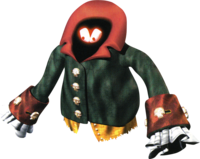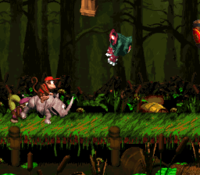Kloak
| Kloak | |||
|---|---|---|---|
 Artwork of a Kloak | |||
| First appearance | Donkey Kong Country 2: Diddy's Kong Quest (1995) | ||
| Latest appearance | Donkey Kong Country 2 (GBA) (2004) | ||
| Variant of | Kremling | ||
| |||
| |||

Kloaks are undead Kremlings serving as part of the Kremling Krew. Kloaks only appear in Donkey Kong Country 2: Diddy's Kong Quest, and are one of the few enemies from the game to not return in Donkey Kong Land 2. They are floating green, buttoned waistcoats with skull buttons, a yellow undershirt, red cuffs, and a pair of glowing, red eyes beneath their red collar. Their coats are similar to the ones worn by Krooks. Kloaks attack by throwing objects at Diddy Kong and Dixie Kong, such as Crates and Barrels, or enemies like Spinies and Zingers. However, some Kloaks may throw a useful item, like a Treasure Chest or Bananas. These enemies let out a menacing laugh as they pick out something to throw. Each Kloak throws a certain number of objects, and some Kloaks only throw one thing. After throwing something, the Kloak floats away, although some first swoop at the Kongs before leaving. A Kloak can be defeated from either having a projectile thrown at it, such as a Treasure Chest, being jumped on, a Team-up throw, or from an Animal Friend. Kloaks have the same defeated voice clip as Klingers and Krooks.
Kloaks appear in four levels. They first appear in Barrel Bayou and return in Bramble Scramble, Ghostly Grove, and lastly Screech's Sprint. In Barrel Bayou, there is a Kloak who throws down a Treasure Chest containing a kannonball, which can only be opened by hitting the Kloak with the Chest. Aside from levels, a Kloak also appears in the end credits, where it is categorized as part of the "Kremling Kuthroats" class, which indicates they are Kremlings.
In the Game Boy Advance version, there is also a Kloak in the Funky's Flights mission Cool Sounds, where it guards Funky Kong's lost ghetto blaster deep in an ice cave. This Kloak attacks by throwing barrels, and unlike other enemies, defeating it requires several shots from the Gyrocopter, instead of just one. Kloaks were also given a different laugh, which is a stock sound effect from the Cartoon Trax Volume 1 sound effects library by The Hollywood Edge. The same laugh has also been used by Rare Ltd. in other Donkey Kong games, such as King K. Rool in Donkey Kong 64, and Kroc in the Game Boy Advance remake of Donkey Kong Country 3. Additionally, if the player pauses the game as Kloak is defeated, its laugh can be heard in its normal manner, rather than getting deeper and slower.
As revealed by game designer Gregg Mayles, Kloak (or at least a Kremling magician enemy with that name) was originally intended to debut in the first Donkey Kong Country, but was cut.[1]
Profiles
Donkey Kong Country 2: Diddy's Kong Quest
- SNES instruction booklet (page 30): "These ghostly, Kremling spirits haunt many locations on Crocodile Isle."
- Donkey Kong Country 2: Diddy's Kong Quest Player's Guide (page 15): "These mean-spirited spooks are on the lookout for any hairy intruders into their domain! Kackle haunts the Kremland amusement park, while Kloak fades in and out of several different areas. Dealing while Kloak is especially frustrating, since he sometimes conjures up Zingers to block paths or items."
- Computer and Video Games vol. 170 (page 70): "Spooky Kremling who makes unexpected appearances, then chucks something unpleasant your way."
- GBA instruction booklet (page 23): "These ghostly Kremling spirits haunt many locations on Crocodile Isle."
Levels
Gallery
Names in other languages
| Language | Name | Meaning | Notes |
|---|---|---|---|
| Japanese | クローク[?] Kurōku |
Kloak | |
| French | Kape[?] | - | |
| Italian | Spetrun[?] | Probably a dialect form for "spettro" (spectre/ghost) | |
| Spanish | Kloak[?] | - |
References
- ^ Ghoulyboy (August 10, 2018). Never expected this tweet about #KingKRool in #SmashBros to be so popular. As a moderately interesting bonus follow up, an early naming sheet shows K. Rool was going to be 'Kommander' and #DKC was going to be called 'Monkey Mayhem'. Twitter. Retrieved August 10, 2018.
| Kremlings | |
|---|---|
| Characters | Congazuma • Cranky K. Rool • Draglinger • General Klump • Giant Viking Kremling • Green Kroc • Jr. Klap Trap • Junklomp • K. Lumsy • Kalypso • Kaptain Skurvy • Kass • Kerozene • King K. Rool • King Kut Out • Kip • Klubba • Kleever • Kludge • Krunch • Krunch's mother • Krusha • Krushy • Kudgel • Kutlass • Mega Amp • Okusan • Quint Skurvy • Resident demon |
| Species | Bazuka • Ghost • Kaboing • Kaboom • Kackle • Kannon • Kasplat • Klampon • Klank • Klaptrap • Klasp • Klinger • Kloak • Klobber • Klomp • Klump • Knocka • Kobble • Koin • Koindozer • Kopter • Kosha • Kracka • Krash • Kremling (boater) • Kremling cop • Krimp • Kritter • Kroc • Krockhead • Krook • Krumple • Kruncha • Krusha • Kuchuka • Kuff 'n' Klout • Kutlass • Re-Koil • Robokremling • Rock Kroc • Shroom • Skeleton Kremling • Skidda • Super Team goalie |

